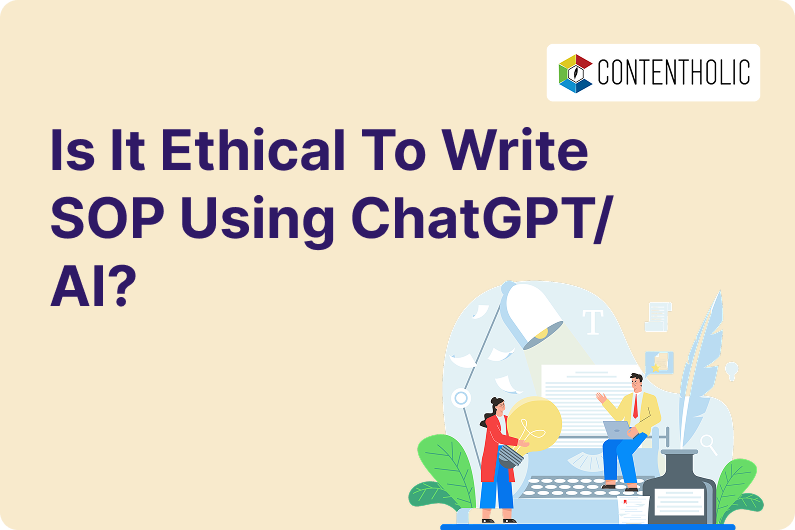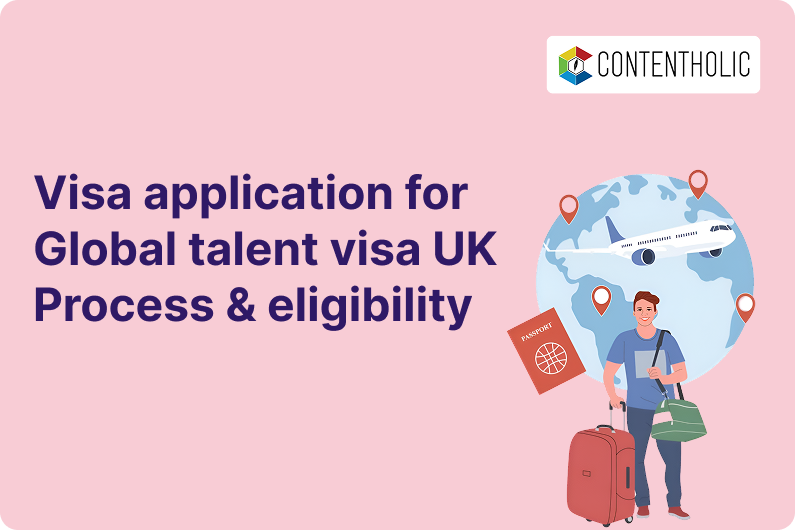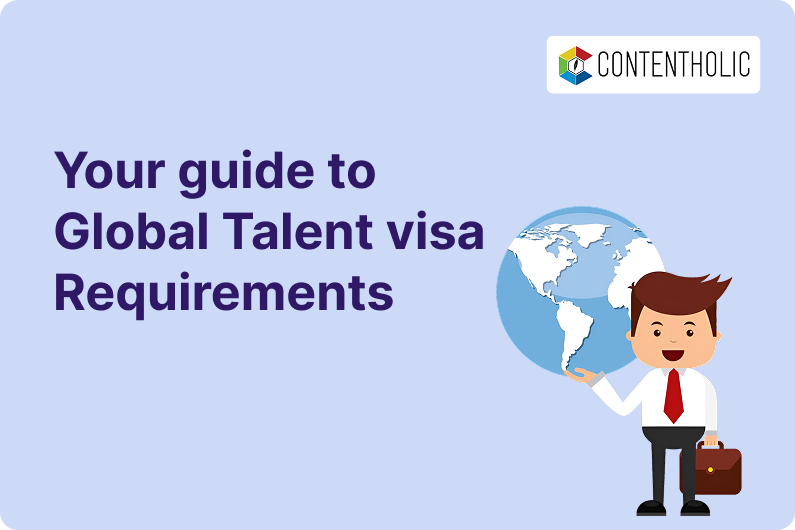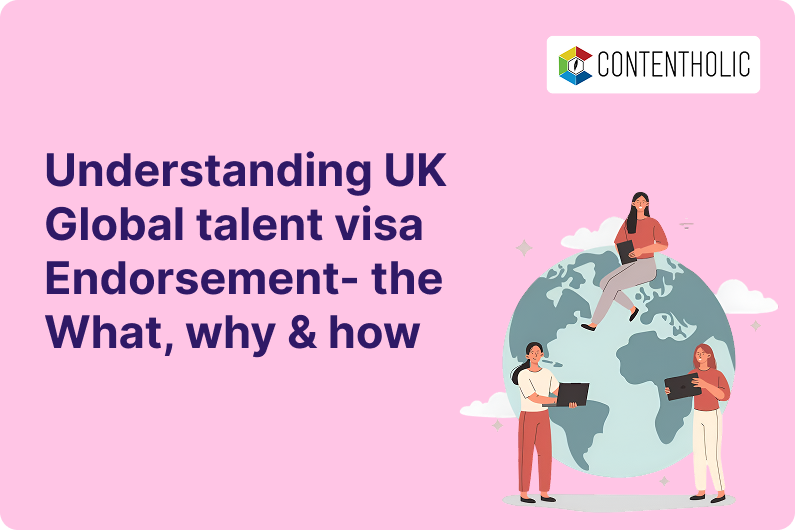Can I use ChatGPT for my college application, is it ethical? This is a question that is often asked these days. In an attempt to find an easy solution to their problems, people these days are rapidly using AI. The use of AI tools like ChatGPT in academic writing has increased manifold. Right from, scholarship essays to university SOPs, LORs, and resumes, you can see how much students are relying upon AI to get their work done.
SOPs are meant to be a reflection of your character, capabilities, and experiences. Writing a SOP needs the essence of a human touch and imagination, which AI can’t produce. Even though ChatGPT can create material for your SOP, it can’t reflect your voice and viewpoint. It is always better to write an SOP on your own or to seek help from professional SOP writers. In India, Contentholic provides one of the best SOP writing services. In this blog, we will be focusing on whether the use of ChatGPT/AI to write an SOP, is ethical or not.
Reasons why it is Not Ethical to write an SOP using ChatGPT/AI
If you are about to write a SOP using AI, then stop right there. It may seem like an easy way out, but it is more likely to cause you more harm than any good. Using AI tools like ChatGPT to write a SOP raises several ethical concerns, such as:
1. Lack of Authenticity
A Statement of Purpose (SOP) is you providing an insight about yourself and not a machine. ChatGPT won’t be able to understand your emotions and perspectives when you decide to study abroad for a particular course and how it will help you advance in your career. An SOP is a testament to your journey and experiences, it is meant to be in your voice. An SOP written by AI lacks a personal touch, it raises questions about your character and eligibility for studying abroad.
2. Misrepresentation
Writing an SOP based on your thought process all by yourself or through the help of professional SOP writers, is more likely to be in tune with your personality and your reasons for choosing a specific field of study abroad and how it will benefit you in the future. Whereas, AI-generated SOP will fail to understand your perspective and will produce content that is not in line with who you are and what you aspire to achieve.
3. Generic Content
ChatGPT/AI writes based on the learned patterns it finds on the internet and not based on your needs and interests. A SOP written by AI will seem very impersonal and will fail to distinguish you from the other applicants who may have the same choice of course and university. A SOP is all about portraying yourself in the best possible manner that proves your worth, which is something that can’t be done if you decide to use ChatGPT for writing it.
4. Informal Language
AI tools like ChatGPT when used to write an SOP, give statements that do not establish a formal, yet conversational tone with the reader. It produces content that is very basic and fails to provide a proper background/ context for understanding. It may write an SOP filled with difficult words and sentences that may not be comprehensible for the University admissions panel and Immigration officials.
5. Plagiarism Risks
If your SOP is written by an AI tool like ChatGPT, it is most likely to be detected by the university admissions panel and the Immigration department. They are quite efficient in using AI detection tools and technologies to verify the authenticity of an application. An AI-generated SOP without any modifications could be flagged for plagiarism, which can lead to serious repercussions for your college application.
6. Inaccuracy
Taking out time and effort to write your SOP is worth it. However, turning to quick solutions like using AI to write an SOP, will lead to incorrect details and exaggerations of certain things that are not as per the university and Immigration guidelines for an SOP. A human-generated SOP demands research which requires proper understanding and analysis. On the other hand, AI will present content that may not be related or verified and is not according to the prescribed format for an SOP.
7. Over-reliance on Technology
By relying upon ChatGPT to write your SOP, you fail to utilize your mind and produce very poorly drafted content. This diminishes your writing skills and ability to express yourself in words. When you write an SOP on your own, you get to articulate your goals, achievements, and aspirations, which can be beneficial for you. AI robs you of the opportunity to engage in a learning process where you get to reevaluate yourself.
8. Rejection
Your SOP is most likely to be rejected as universities and Immigration authorities have strict rules and policies when it comes to plagiarism. They don’t entertain individuals who resort to such unfair means and may also blacklist you. A human-generated SOP is written by investing a lot of time and effort through careful thinking and introspection unlike an AI-written one. Seeing your genuine efforts in producing an SOP with original content and a reflection of your thought process and understanding, your application is most likely to be approved.
Conclusion
Crafting your SOP based on your understanding and viewpoint seals the deal. It brings into the picture your genuine interest and motivation towards a particular course and how it will help you have a better future. University and Visa officials look for originality and uniqueness in an SOP to evaluate the worth of a candidate, which can only be seen in an SOP written by a human. AI tools like ChatGPT are simply not equipped with the knowledge to write an SOP based on a student’s story and experiences. It fails to resonate with the University admissions panel and the Immigration authorities. Therefore, you should be mindful of the potential risks and ethical concerns when it comes to writing an SOP using ChatGPT.
If you feel that your SOP requires further assistance, then contact reputed companies like Contentholic which provides the best SOP writing services in India. Our writers are known for producing error-free, and plagiarism-free content. So, feel free to contact us.






